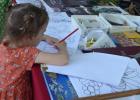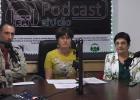07.06.2022
The Institute of Zoology joined on Saturday, 4 June 2022, the ecological community of the Republic of Moldova to mark the World Environment Day. The event was organized in Valea Morilor Park in Chisinau by the Association of Environmental Journalists, with the generous support of international funding organizations. The Institute of Zoology presented pieces from the collections of the Museum of Fossil Faunistic Complexes of Moldova and the Museum of Entomology, a collection of aquatic mollusks and several books dedicated to the fauna of the Republic of Moldova, thus capturing the attention of ...
01.06.2022
On 18 May 2022, researchers of the Institute of Zoology held a press conference dedicated to the completion of the project 2 SOFT/1.2/47 Team up for healthy fish in aquaculture systems of the Prut river basin - TeamUp HealthyFish (Joint Operational Program Romania-Republic of Moldova 2014-2020, funded by the European Union). EcoFM radio channel hosted the conference and broadcasted it on its Facebook page. The speakers – Cor.mem. Elena Zubcov, Dr. Nadejda Andreev and Dr.Hab. Dumitru Bulat – informed journalists and the public about the activities carried out and the main results obtained ...
31.05.2022
Between May 14-15, 2022, in the village of Văleni, Cahul district, the ninth edition of the National Ethno-Folk Festival “Sweet Acacia Flower” took place. On the first day of the festival the museum night was celebrated and the Museum of History and Ethnography of Văleni village opened its chest with memories to get acquainted with the roots, values and customs of the ancestral people. There were speeches about the first families of mocans who settled on the banks of the Prut river and about the folk clothes they wore proudly. On the second day there was the official opening of the festival ...
















